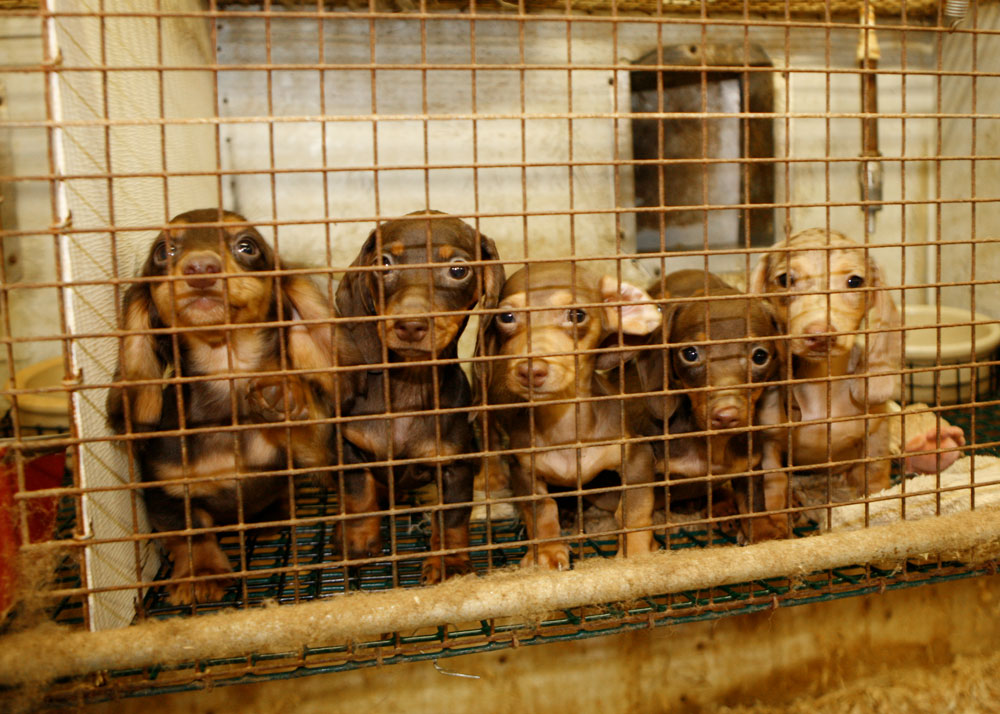Disclaimer: We do not condemn and have no intention to shame anyone who wishes to shop for pets. If you are looking to shop for a pet, this article is meant to help you potentially detect unethical breeders and pet shops, to try and ensure that you are not inadvertently contributing to an illicit pet trade.
We would also like to disclaim that we are not experts. This article was written after months of extensive research and some are opinions of our own.

Modern Dog: Dogs kept in tight cages in a puppy mill.
The problem with the pet trade at this current juncture is simply a lack of awareness and education. This allows unethical breeders to exploit this knowledge gap to disregard the animals' welfare while generating huge profits. i.e. mass-breeding facilities in which dogs are treated like puppy-producing machines forced into cramped & dirty spaces, commonly known as "puppy mills".
At this point, it is important that we clarify the distinction between a breeder, and a typical pet shop that sells puppies. A breeder is someone that intentionally mates selected dogs to maintain or produce specific qualities or characteristics of dogs, while pet shops typically import or buy puppies from breeders. This means that any pet shop that attains its supply of puppies from unethical breeders, are in fact exacerbating the problem as potential buyers are simply misled into making a supposedly ethical decision from such "licensed" pet shops. Pet shops can sometimes act like the "middleman" that prevents the consumer from seeing the hellish conditions of puppy mills.
It is therefore important that we understand the root of the problem - unethical breeders.
Who or what is considered an unethical breeder? An unethical breeder is, quite simply, one that does not care enough for the animals' welfare. While this could also be subjective, here is what we found are 4 red flags to identify an unethical breeder:
1. Poorly maintained living conditions
This is the most basic of all. The responsibility is on you as the potential buyer to assess: how is the environment where the animals are living like? Is it cramped, dirty, and not maintained? If so, not only does the breeder not care for the animals' wellbeing, but they are also willing to sell dogs that are more likely to catch diseases in such an environment to unsuspecting buyers.
If no kennel visits are allowed due to the current pandemic, the breeder should at least allow a live virtual tour. If the breeder is avoiding even virtual visits, this would be a massive red flag.
2. No health checks
Ethical breeders who truly care about improving the breed - and are not merely motivated by profits - would have covered the groundwork of ensuring genetic and health issues are checked and tested, and will have the paperwork to prove it.
3. Breeder or Seller is not keen to entertain your questions
A true ethical breeder will appreciate your questions, as this signals to them that you are trying to find out as much as possible to make an informed decision on getting a pet. It shows that you are trying to make a responsible decision. A true ethical breeder will also ask the potential buyer a lot of questions to make sure that they are selling their pet to someone who will be responsible for giving the pet a loving home for its lifetime.
4. Contractual Agreement
Ethical breeders will almost always sign a contractual agreement with you to return the pets if you are no longer able to be responsible for them. This is another signal that they truly care about the wellbeing of the animal and do not want the dog to be abandoned.
Tip: In addition to the above, ensure that all verbal agreements are committed in writing to protect yourself in the event of any future disputes. This agreement, or sale contract, could be useful if you were indeed sold a "defective" pet. Read more about how the lemon law protects pet buyers here.
With the above pointers in mind, it would be nearly impossible to do any of the above if one were to purchase from a pet shop that buys or imports from other sources. While pet shops in Singapore are required to only attain pets from licensed pet farms, these regulations are, unfortunately, not enforced strictly and backyard breeders can easily supply to these pet shops. (We have also reached out to NParks & AVA on how these pet farms that supply puppies were selected and will update the article once we receive an update.)
At the end of the day, if you are unsure of whether you might be indirectly contributing and boosting the demand to an illicit trade that is puppy mills, we hope that you can consider adopting a dog from these shelters instead.
If you are a breeder, pet shop owner, or anyone who can give us more insights on this topic, please reach out to us in the comment section below or at hello@thetwinship.co. We would love to hear more about your perspective and have a healthy discussion.
